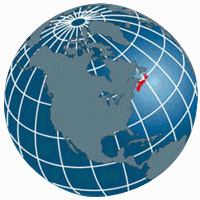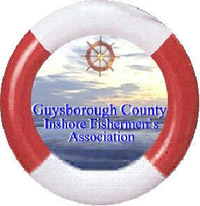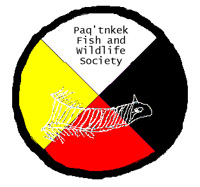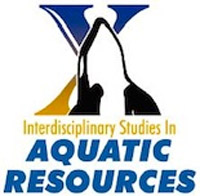SRSF, this Community-University Research Alliance (CURA), partners Mi’kmaq and non-native fish harvesters organizations with St. Francis Xavier University’s research capacity and know-how as well as with the research and educational expertise affiliated with Interdisciplinary Studies in Aquatic Resources (ISAR).
A core purpose of the partnership is to develop applied research capacity within and research relations between marine harvesting community organizations and the university community.This project is based out of Antigonish, Nova Scotia, but the SRSF partners are situated throughout the whole province of Nova Scotia, Canada. Click here to find out where these various partners are located. |
 |
Key goals are to:
-
Further develop and enhance Mi’kmaq and non-native fisher organization and membership collaborations.
SRSF will mobilize social research know-how, capacity and literacy as its contribution to building the critical skill sets required for non-native and First Nation organizations to assume more direct and effective roles in sustainably managing marine resource ecosystems. This is particularly important in light of the recent Marshall decision handed down by the Supreme Court. It is also important given the fact that fishing organizations are gradually assuming a more direct role in the governance of marine ecosystems and resource harvesting.
-
Have the non-native and Mi’kmaq groups work with their St.FX partners and university-seated researchers to enhance expertise in areas such as documenting fishers’ ecological knowledge, recording family and community histories in fishing, mapping local marine habitats, developing business and organization skills, and many other initiatives
-
Build marine harvester research know-how and skill sets
SRSF also develops and offers social research design and methodology seminars and workshops for the purpose of building marine harvester research know-how and skill sets
-
Provide applied research internships
SRSF also provides applied research internships for as many as five St.FX and Mi’kmaq social sciences and business students per year.
Project Partners
The CURA’s partners include the Gulf Nova Scotia Bonafide Fishermen’s Association, Guysborough County Inshore Fishermen’s Association, Interdisciplinary Studies in Aquatic Resources (StFX), and Paq’tnkek Fish and Wildlife Society.
 |
The Gulf Nova Scotia Bonafide Fishermen’s Association (GNSBFA)
The GNSBFA is an organization formed to represent the interests and concerns of the Nova Scotian Bonafide fishermen working within the Lower Northumberland Strait, Southern Gulf of St. Lawrence and St. Georges Bay regions. The GNSBFA’s first responsibility is to represent its membership’s concerns in fisheries management meetings that decide on subjects such as policy, annual allocations, regulations, and fishing effort. The GNSBFA recognizes that fulfilling this responsibility requires that it have access to and knowledge about research and research results. An example of the GNSBFA’s interest and involvement in research is the St. Georges Bay Ecosystem Project. The GNSBFA is a founding partner in this project and has been instrumental in its definition and development. |
 |
The Guysborough County Inshore Fishermen’s Association (GCIFA)
The Guysborough County Inshore Fishermen’s Association is a group of Inshore Fishermen originally formed in 1973. Currently its membership consists of 103 fisher persons, most of whom have CORE Status (83%). The focus of the organization is to develop working relations among Eastern Guysborough County fishers for the purposes of:
The GCIFA has established research partnerships with ISAR at St. Francis Xavier University, the Guysborough County Women’s Fishery Enhancement Association (GCWFEA), Sable Offshore Energy Inc., Guysborough County Regional Development Authority, the Province of Nova Scotia Department of Fisheries and Aquaculture, and the Federal Department of Fisheries and Oceans. For instance, the GCIFA has completed the second year of a five year Lobster Enhancement Project in Eastern Guysborough County. The GCIFA is also currently collaborating with the GCWFEA and the CCBM in the first year of a Scallop Enhancement Project.
|
 |
The Paq’tnkek Fish and Wildlife Society (PFWS), Paq’tnkek First Nation
The Paq’tnkek Fish and Wildlife Society (PFWS) was established in 2000 as the Mi’kmaq Fish and Wildlife Commission was wound down after learning that its core funding would no longer be available. PFWS is located in the counsel offices of the Paq’tnkek First Nation, a Mi’kmaq community located approximately 25 kilometers from Antigonish, Nova Scotia. PFWS is tasked to further develop Mi’kmaq knowledge of natural resource-centered research and to enhance Mi’kmaq research capacity. A priority area for the Society is to enhance Mi’kmaq natural resource management capacity. In particular the Society is working to increase the role of the Mi’Kmaq people in management of the region’s fishery. This is necessary to improve management of the food fishery for the peoples’benefit as well as for the generations to come. It is also important to improve capabilities to participate effectively in the commercial fishery, and to create employment and income necessary for community development. In order to meet this mandate, the Society undertakes activities and projects in the following areas:
|
 |
Interdisciplinary Studies in Aquatic Resources (ISAR)
SRSF is associated directly with the research and educational mission of Interdisciplinary Studies in Aquatic Resources (ISAR). ISAR consolidates and builds upon a critical mass of St.FX resident interdisciplinary expertise in aquatic resources research and education. It offers a four year programme of undergraduate education leading to BA, BSc, and BBA (Bachelor of Business Administration) degrees. All ISAR majors are required to complete a work experience internship within an aquatic resource setting. In part through the student internship programme, ISAR faculty and students have initiated and sustained collaborative working relationships with industry, community organizations and government aquatic resource stakeholders. ISAR also facilitates interdisciplinary and applied research through linking research and research education expertise with specific projects and potential sources of funding. An interdisciplinary team of ISAR-linked university faculty has been developed. Additional St.FX faculty with marine/fisheries research interests are invited to participate in research opportunities matched with their backgrounds. |
For more information on this CURA, please contact the project director, Dr. Anthony Davis.